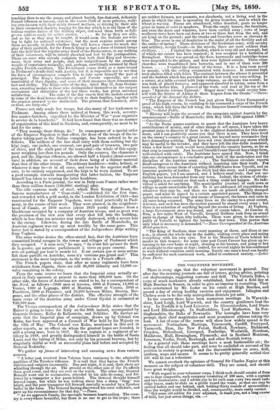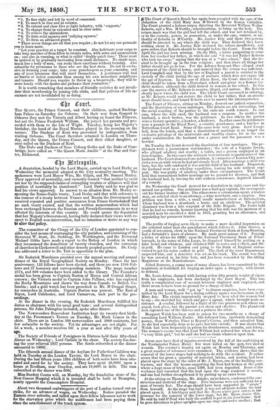THE VOLUNTEER MOVEMENT.
There is every sign that the volunteer movement is general. Day after day the morning journals are full of letters, giving advice, pointing out shortcomings, suggesting costume and drill. The Victoria Rifles, a corps of crack marksmen already established, have had a field day at High Beeches in Sussex, in order to give an impetus to recruiting. They were entertained by Mr. Loder on his estate at High Beeches, and passed a day of strong healthy exercise and enjoyment. Islington and Chelsea seem to be the only metropolitan districts yet astir. In the country there have been numerous meetings. In Warwick- shire, Lord Leigh, Lord Warwick, and the country gentlemen lead the way. In Norfolk it is Lord Leicester. In Gloucestershire, Lord Duck and Lord Ellenborough. In Staffordshire, Lord Hatherton. In Not- tinghamshire, the Duke of Newcastle. The boroughs have been very prompt, their chief magistrates and most prominent citizens taking the lead. A list of some of the towns will show how widely spread is the movement : Nottingham, Hastings, Tynemouth, Cardiff, Pontypool, Yarmouth, Eton, the New Forest, Stafford, Newbury, Richmond, Croydon, Birkenhead, Liverpool, Tonbridge, Woolwich, Horsham, Maidstone, Hull, Birmingham, Plymouth; and in Scotland Montrose, Inverness, Forfar, Perth, Roxburgh, and other Scottish towns. As a general rule these meetings have a most businesslike air; the feeling that all should take part, and none be excluded on account of his position in society is general ; and the discussioni Wens on arms, drill, uniform, ways and means. It seems to be pretty generally settled that 101. will fit out a volunteer.
We cannot overlook the opinions of General Sir Charles Napier at this moment on the subject of volunteer drill. They are sound, and should have great weight.
"With regard to your volunteer corps, I think each should consist of from one to four companies, each company consisting of 100 men, with a captain and two lieutenants ; and I advise you to let each man carry two small cart- ridge boxes, made to slide on a girdle round the waist, so that one may be carried before and one behind, each holding thirty rounds of ammunition ; thus the weight would be divided, and, consequently, more easily carried.
"Get some old soldier for your adjutant, to teach you, not a long course of drill, but just seven things, viz. :—
"1. To face right and left by word of command. "2. To march in line and in column.
"3. To extend and close files as light infantry, with supports.' "4. To change front in extended and in close order. "5. To relieve the skirmishers.
"6. To form solid squares and 'rallying squares.' "7. To form an advanced guard. "These seven things are all that you require ; do not let any one persuade you to learn more. "Let your practice at a target be constant. Also habituate your corps to take lone marches of from fiften to twenty miles, with arms and ammunition on; and also in running, or what is called double quick time.' These must be arrived at by gradually increasing from small distances. No single man, much less a body of men, can make these exertions without training. Also subscribe for premiums to those who are the best shots. Do not be exclu- sive in forming your corps ; take your :gamekeepers as your comrades, and any of your labourers that will enrol themselves. A gentleman will find no braver or hotter comrades than among his own immediate neighbours and tenants. Should you require to throw up a breastwork, - they will be more handy with the spades and pickaxes than yourselves."
It is worth remarking that members of friendly societies do not invali- date their membership by joining rifle clubs, and that policies of life in- surance are not invalidated by so doing.



























 Previous page
Previous page